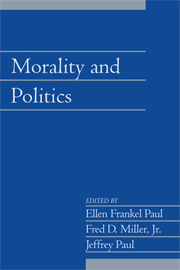Book contents
- Frontmatter
- Contents
- Introduction
- Acknowledgments
- Contributors
- What's Morality Got to Do With It? Making the Right Distinctions
- Unauthorized Humanitarian Intervention
- Thinking Constitutionally: The Problem of Deliberative Democracy
- Representing Ignorance
- Dual Citizenship and American Democracy: Patriotism, National Attachment, and National Identity
- Policy Implications of Zero Discounting: An Exploration in Politics and Morality
- Reflections on Espionage
- Mr. Pinocchio Goes to Washington: Lying in Politics
- A Subject of Distaste; An Object of Judgment
- Against Civic Schooling
- Political Morality as Convention
- Autonomy and Empathy
- God's Image and Egalitarian Politics
- Should political Liberals Be Compassionate Conservatives? Philosophical Foundations of the Faith-Based Initiative
- Index
Policy Implications of Zero Discounting: An Exploration in Politics and Morality
Published online by Cambridge University Press: 04 August 2010
- Frontmatter
- Contents
- Introduction
- Acknowledgments
- Contributors
- What's Morality Got to Do With It? Making the Right Distinctions
- Unauthorized Humanitarian Intervention
- Thinking Constitutionally: The Problem of Deliberative Democracy
- Representing Ignorance
- Dual Citizenship and American Democracy: Patriotism, National Attachment, and National Identity
- Policy Implications of Zero Discounting: An Exploration in Politics and Morality
- Reflections on Espionage
- Mr. Pinocchio Goes to Washington: Lying in Politics
- A Subject of Distaste; An Object of Judgment
- Against Civic Schooling
- Political Morality as Convention
- Autonomy and Empathy
- God's Image and Egalitarian Politics
- Should political Liberals Be Compassionate Conservatives? Philosophical Foundations of the Faith-Based Initiative
- Index
Summary
INTRODUCTION
What are our political obligations to future generations? How does morality suggest that we weight current interests against future interests? Do politics or markets place greater weight upon interests in the very distant future? How should we discount future costs and benefits?
A ‘discount rate’, by definition, tells us how to compare future benefits to current benefits (or costs) in a consequentialist calculus. A zero discount rate means that the future counts for as much as the present. Insofar as the discount rate is high, we are counting future costs and benefits for less.
Elsewhere, I have argued that we should consider using a zero rate of intergenerational discount for well-being and sometimes for dollars as well. We should not weigh the interests of future people less, simply because they come in the future. Here I seek to extend these arguments. I consider in detail what a zero discount rate would mean for policy-making, and for ethics more generally.
Economists, who tend to be market-oriented (at least relative to philosophers), usually resist the idea of zero discounting. They see market prices as prima facie indicators of the value of resources. Market rates of interest are typically positive and nonzero in both nominal and real (i.e., inflation-adjusted) terms. Economists therefore usually favor some positive rate of time-discount, based on these market interest rates, perhaps adjusted for risk or other complicating factors.
- Type
- Chapter
- Information
- Morality and Politics , pp. 121 - 140Publisher: Cambridge University PressPrint publication year: 2004



